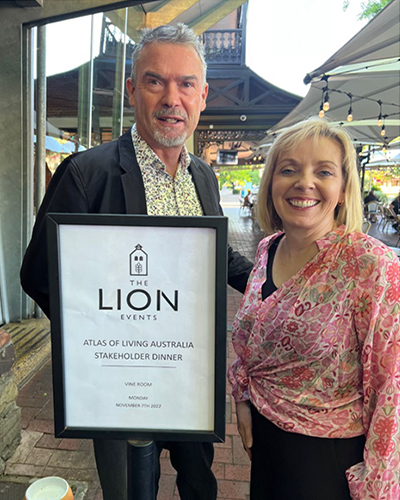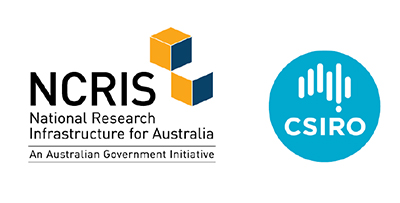Chair’s Communique Atlas of Living Australia Advisory Board, Atlas of Living Australia Advisory, November 2022
MEETING #16, November 2022, Adelaide
The 16th meeting of the Atlas of Living Australia (ALA) Advisory Board was held on 8th November 2022. Board participants included Kate Brandis, Peter Brenton, David Cantrill, Bec Christensen, Ian Cresswell, Matt Miles, Toni Moate, Stephen Van Leeuwen and Andre Zerger. We were also pleased to be joined by Tania Laity, Aliza Levy, Erin Roger, Cam Slatyer, Ely Wallis and Ed Wensing.
Advisory Board
It was a pleasure to welcome Dr Kate Brandis (UNSW) to her first ALA Board meeting. Kate will represent the ecological sciences sector on our Board and I look forward to working with Kate.
Adelaide stakeholder dinner
It was wonderful to host a stakeholder dinner in Adelaide at The Lion Hotel on the evening prior to our Board meeting. Guests represented the Council of Australian Museum Directors, CSIRO, South Australian Department of Environment and Water, University of Adelaide, Flinders University, South Australian Museum and the Terrestrial Ecosystems Research Network. We are grateful to everyone who joined us, and it was fun evening learning more of the excellent science being undertaken in South Australia.
Director’s update
The ALA Director provided an update on major strategic activities, partnerships and progress since the last meeting in July 2022. Of particular note:
- ALA’s successful nomination to host the next annual meeting of the Global Biodiversity Information Facility Governing Board meeting in Canberra in October 2023.
- The recent departure of ALA’s Deputy Director Hamish Holewa
- to lead the Australian Research Data Commons (ARDC) Planet Research Data Commons Program
- Release of ALA’s 2021-22 Year in Review
- The internal release of ALA’s cybersecurity management portal, monitoring more than 64 servers
- Development of a prospectus to extend ALA’s Australian Biodiversity Data Mobilisation Program through industry and government partnerships.
ALA Aboriginal and Torres Strait Islander people’s future engagement pathways review
The ALA is committed to extending its engagement with Aboriginal and Torres Strait Islander peoples beyond the current program and in a manner that is Indigenous-led. Understanding where to focus and expand remains a challenge given the breadth of opportunities. To consider future pathways the ALA has partnered with Ed Wensing and Aliza Levy (SGS Consulting) to work with national stakeholders with an interest and experience in Indigenous biodiversity science, and natural resource management to develop future options and recommendations. The Board were briefed on the scope, duration, and expected outputs from the project, and highlighted the importance of this work to the ALA program.
Citizen Science – advances, opportunities and risks
Dr Erin Roger, ALA’s citizen science lead joined the Board to present the current status of the citizen science program in the ALA, in the context of national and international trends. Citizen science, coupled with other technologies and supported by professionals, has huge potential to contribute to large-scale biodiversity monitoring and analyses.
For example, citizen science systems using AI are advancing science through a variety of mechanisms including increasing the speed and scale of data processing, extending the temporal and geographical scope, and improving the quality of data collected and processed. The Board noted the fundamental role of citizen science in supporting biodiversity monitoring and science, particularly given the significant gaps in Australia’s understanding of its biodiversity
Restricted Access Species Data Pathways Project

Appropriate exchange of data on Australia’s most sensitive species has been a challenge since biodiversity data was first digitised. This project is a collaboration between the ALA, ARDC, conservation agencies, museums, herbaria, EcoCommons and the Western Australian Biodiversity Science Institute to improve access to withheld or modified biodiversity data by streamlining processes and systems to enable the sharing of restricted data for users with the appropriate authority.
Ms Tania Laity and Mr Cam Slatyer presented the draft framework, and progress towards the development of the operational service. Given the highly sensitive nature of this work, the board explored stakeholder engagement strategies, proposed governance arrangements and the role of this project to other initiatives like the Biodiversity Data Repository.
The Board noted the potentially transformational role of the framework once it delivers both the technical and governance mechanisms that ensure the safety of all types of data
In conclusion
I’d like to thank Sandy Caruthers and Matt Miles (SA Department of Environment and Water) for hosting our meeting in Adelaide.

The Board and I look forward to our next meeting in March in Canberra.
Dr Ian Cresswell
Chair, Atlas of Living Australia
Advisory Board
November, 2022

